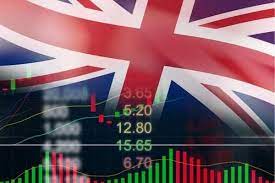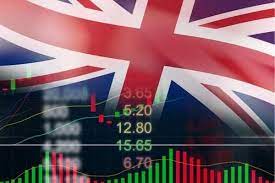
On Tuesday, Rishi Sunak became Britain's third prime minister in two months, promising to lead the country out of a deep economic crisis and restore trust in politics.
Sunak quickly reappointed Jeremy Hunt as finance minister, attempting to calm markets that had been alarmed by his predecessor's debt-fueled economic plans.
The former hedge fund manager promised to unite the country and was expected to form a cabinet from all factions of the party to end infighting and abrupt policy changes that have shocked investors and alarmed international allies.
Sunak spoke outside his official Downing Street residence, praising his predecessor Liz Truss' ambition to reignite economic growth while admitting mistakes had been made.
"I have been elected as leader of my party and your prime minister, in part to fix them," said Sunak, who broke with the tradition of standing beside his family and cheering political supporters.
"I understand, too, that I have work to do to restore trust, after all that has happened. All I can say is that I am not daunted. I know the high office I have accepted and I hope to live up to its demands."
Sunak stated that difficult decisions must be made in order to reduce government spending. Truss appointed Hunt to calm markets roiled by Truss's rush for growth, and he has been preparing a new budget alongside borrowing and growth forecasts due out on Monday, and he warned on Tuesday that "it is going to be tough."
The new prime minister also reinstated Dominic Raab as deputy prime minister, a position he had lost during Truss' 44-day tenure, but reappointed James Cleverly as foreign minister and Ben Wallace as defence secretary.
Penny Mordaunt, who lost her leadership bid to Sunak on Monday, retained her position as leader of the House of Commons, which organizes the government's business in the lower house of parliament.
According to sources, she aspires to be foreign minister.
Sunak was seen as appointing ministers from across the Conservative Party while leaving others in place, which should allay concerns that Sunak would appoint loyalists rather than try to unite the party.
Sunak, one of parliament's wealthiest members, is expected to cut spending to plug a 40 billion pound ($45 billion) hole in the public finances caused by a slowing economy, higher borrowing costs, and an energy support scheme.
He must now examine all expenditures, including those in politically sensitive areas such as health, education, defense, welfare, and pensions. However, with his party's popularity plummeting, he will face mounting calls for an election if he abandons too many of the promises made if the Conservatives win the election in 2019.
Economists and investors have welcomed Sunak's appointment, with Ryanair CEO Michael O'Leary declaring that "adults have taken charge again," but they warn that he has few options to fix the country's finances at a time when millions are facing a cost-of-living crisis.
Sunak, who led the Treasury during the COVID-19 pandemic, promised to prioritize economic stability and confidence. "Difficult decisions will have to be made," he said shortly after accepting King Charles' request to form a government.
Sunak also pledged to prioritize the needs of the public over political considerations, recognizing the growing resentment of Britain's political class and the ideological battles that have raged since the historic 2016 Brexit vote.
Workers on their way to London's financial district said Sunak, Britain's youngest prime minister in more than 200 years and the country's first leader of color, appeared to be the best of a bad bunch.
(Source:www.aljazeera.com)
Sunak quickly reappointed Jeremy Hunt as finance minister, attempting to calm markets that had been alarmed by his predecessor's debt-fueled economic plans.
The former hedge fund manager promised to unite the country and was expected to form a cabinet from all factions of the party to end infighting and abrupt policy changes that have shocked investors and alarmed international allies.
Sunak spoke outside his official Downing Street residence, praising his predecessor Liz Truss' ambition to reignite economic growth while admitting mistakes had been made.
"I have been elected as leader of my party and your prime minister, in part to fix them," said Sunak, who broke with the tradition of standing beside his family and cheering political supporters.
"I understand, too, that I have work to do to restore trust, after all that has happened. All I can say is that I am not daunted. I know the high office I have accepted and I hope to live up to its demands."
Sunak stated that difficult decisions must be made in order to reduce government spending. Truss appointed Hunt to calm markets roiled by Truss's rush for growth, and he has been preparing a new budget alongside borrowing and growth forecasts due out on Monday, and he warned on Tuesday that "it is going to be tough."
The new prime minister also reinstated Dominic Raab as deputy prime minister, a position he had lost during Truss' 44-day tenure, but reappointed James Cleverly as foreign minister and Ben Wallace as defence secretary.
Penny Mordaunt, who lost her leadership bid to Sunak on Monday, retained her position as leader of the House of Commons, which organizes the government's business in the lower house of parliament.
According to sources, she aspires to be foreign minister.
Sunak was seen as appointing ministers from across the Conservative Party while leaving others in place, which should allay concerns that Sunak would appoint loyalists rather than try to unite the party.
Sunak, one of parliament's wealthiest members, is expected to cut spending to plug a 40 billion pound ($45 billion) hole in the public finances caused by a slowing economy, higher borrowing costs, and an energy support scheme.
He must now examine all expenditures, including those in politically sensitive areas such as health, education, defense, welfare, and pensions. However, with his party's popularity plummeting, he will face mounting calls for an election if he abandons too many of the promises made if the Conservatives win the election in 2019.
Economists and investors have welcomed Sunak's appointment, with Ryanair CEO Michael O'Leary declaring that "adults have taken charge again," but they warn that he has few options to fix the country's finances at a time when millions are facing a cost-of-living crisis.
Sunak, who led the Treasury during the COVID-19 pandemic, promised to prioritize economic stability and confidence. "Difficult decisions will have to be made," he said shortly after accepting King Charles' request to form a government.
Sunak also pledged to prioritize the needs of the public over political considerations, recognizing the growing resentment of Britain's political class and the ideological battles that have raged since the historic 2016 Brexit vote.
Workers on their way to London's financial district said Sunak, Britain's youngest prime minister in more than 200 years and the country's first leader of color, appeared to be the best of a bad bunch.
(Source:www.aljazeera.com)





